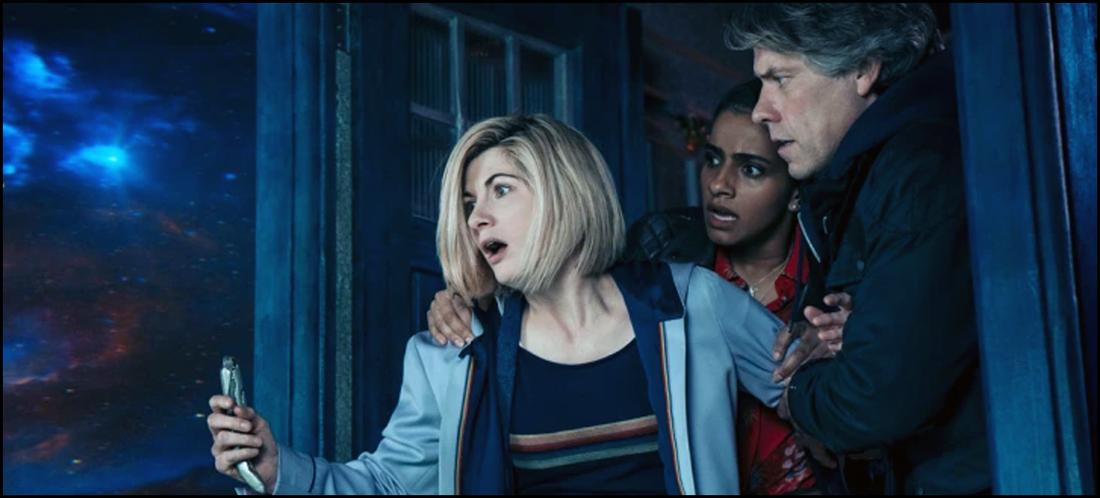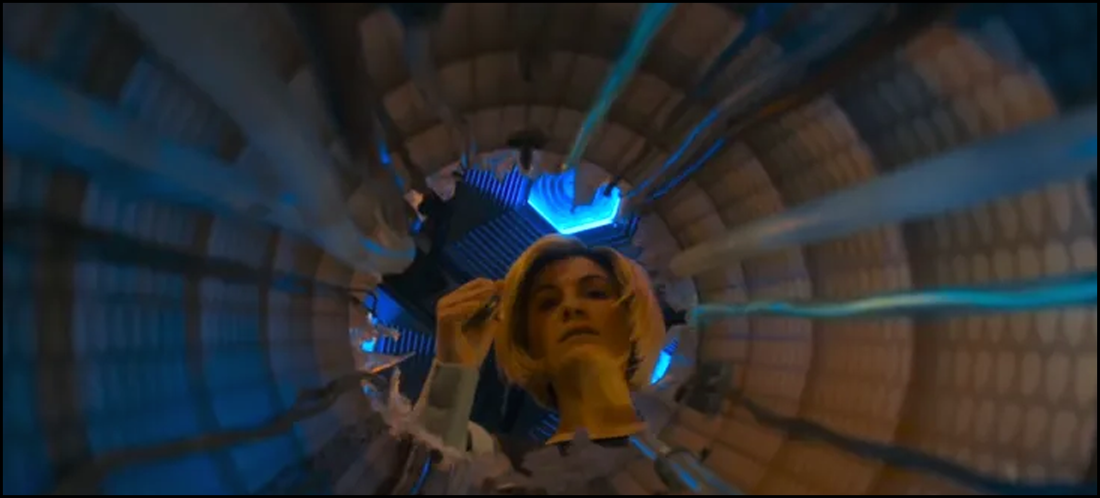When I went away to college, Who was vastly harder to find. Back in those days, the little cowtown private institution I attended was in the middle of nowhere; and TV fodder was increasingly difficult to both find and make time for while studying. Having watched a few arcs from those years, I’ve no problem saying I don’t feel I missed all that much: the Doctor grew a bit more whimsical for my tastes, and the late 1980’s really saw a revolution in Fantasy storytelling that focused on darker and more adult fare.
Still, I was thrilled when the franchise experienced a rebirth. I didn’t see much of Christopher Eccleston’s run as the Time Lord until 2006, but I found it an impressive return to form for a character who’d already been around for four decades and eight regenerations. If anything, those new episodes proven that there were still stories to tell for an audience hungry to find them; and I’ve stayed with the program through some narrative highs and lows ever since.
This brings me to today. Just the other night, I binged the Doctor’s Flux storyline, and I wanted to pen a few thoughts, this being Jodie Whittaker and Chris Chibnall’s swan song season with the franchise. This won’t be anything deep, meaningful, or comprehensive, as I think that there are other websites who provided that kind of episode-by-episode commentary far better than I ever could. I did attempt a go at it during some of Peter Capaldi’s tenure; but the requirements of a life lived pulled me in other directions at the time, and here we are.
Because this isn’t my first rodeo and I’m well aware of how the Information Superhighway works, I want to be perfectly clear about this: I’m not a hater of Jodie Whittaker. While I’ll admit I really wasn’t all that comfortable with the gender-swapping phenomenon with respect to the wider Whoniverse, I’m mature enough to have a wait-and-see attitude about things like this (generally speaking); and I think the actress has done an admirable job with the material she’s been given. Therein lies the rub: it’s incumbent upon any artist to have good writing provided to her, and – at best – the entirety of the Chibnall era has been very uneven. Truly inspired stories have been hard to find, it would seem, but hats off to a cast that stayed focused and did what they could with it.
For all its hype, the Flux story really didn’t go anywhere, at least not anywhere of substance for regular viewers. Sure, it pushed a bit further Chibnall’s expansion of the greater Who mythology, bringing into question not so much who the good Doctor is but more where s/he’s from; but dare I say that those narrative twists have just never interested me all that much. For example, I don’t need to know who, say, John F. Kennedy was or where he came from to appreciate what he did as an American President; and I’ve always approached fictional characters much the same. It’s what they do that matters. I’ve seen the Doctor be a healer, a teacher, a surrogate father, a philosopher, a savior, an insurrectionist, a guide, a fibber, a gracious host, an angry neighbor, a romantic, and the greatest source for good and decency in the galaxy … and I witnessed all of this within giving a tinker’s damn about where s/he was from … so what’s all this about anyway? Much ado about nothing (or very little), if you ask me.
Putting aside the quibbles with the focus on origins, Flux is even less of an achievement mostly because it’s a dire set of circumstances the show has already presented.
There’s a truly sad and insufferable trend in Fantasy program that kinda/sorta goes like this. Season One? Let’s save our hero. Season Two? Let’s save his planet. Season Three? Let’s save his universe. Season Four? Let’s save our hero, his planet, and the universe all at the same time. Season Five? Let’s save life itself, for everyone. Season Six? Let’s save life itself and our hero, his planet, and the universe. Writers and writing teams are constantly seeking to ‘raise the stakes,’ as it were, and they do this thinking it’s what audiences are expecting. While there may be a nugget of truth out there, I’ve tried to give audiences a bit more credit, especially in the intelligence department, and I’ve insisted that, basically, we all just want to be entertained with a damn good story.
For all intents and purposes – and I could be wrong (that is my right) – Flux reached too hard for fan service.
You want an all-new villain? Fine, we’ll give you just that with “Chapter One: The Halloween Apocalypse,” an installment that tried to bring something a bit new by way of the total destruction of everything (sigh), a new race of dog/people, and the new face of evil, Swarm. The adventure’s greatest asset was that it was chocked full of new stuff – always grand to see – but perhaps there was too much as it all felt a bit rushed.
You want the return of a series’ favorite? Fine, we’ll give you just that with “Chapter Two: War Of The Sontarans” which introduced yet one more new race (the Mouri) while bringing back those big-headed potato people, the Sontarans, for another attempt at subverting the Earth. We’ll even flesh out a new character or two in the midst of rewriting Earth history and hope you remember who they are the next time you see them.
Still not interested and want more? Fine. We’ll give you yet one more new character to follow in “Chapter Three: Once, Upon Time,” and we’ll throw all of our series’ regulars into various bits and pieces of their past, banish the Doctor to a kind of temporal limbo, and we’ll challenge you to keep up by saying ‘Time’ isn’t only a force in the universe, but it’s also a place! And … Weeping Angels! There’ll be Weeping Angels! How’s that for excitement?
OK, I can see that you’re not overwhelmed enough at this point, so let’s see what more we can throw on this pile. In “Chapter Four: Village Of The Angels,” we’ll add yet one more nebulous organization to the Whoniverse with ‘Division,’ we’ll split the crew up with some of those Weeping Angels’ shenanigans, and we’ll try to wrap it all up with an even greater threat: the turning of our dear Doctor into Angel stone!
See what I mean?
Flux’s ‘greatest hits’ tour crammed an awful lot of mileage into its six episodes, so much so that Chapters Five and Six were (for me) barely even chronologically coherent. I’ll concede that the pacing of the first four episodes wasn’t all that bad – they even had some solid character moments and used their material to great effect, creating some palpable tension for participants new and old. (Sorry, folks, but John Bishop can’t act.) However, “Chapter Five: Survivors Of The Flux” and “Chapter Six: The Vanquishers” were little more than – ahem – hot garbage, cramming way too much substance with so little time and bloated expository passages to make it all palatable. I’d go so far as to suggest that the last two episodes killed whatever good marks Chibnall and company earned in the first four; they were that untidy. Why, in Episode Six alone, over a span of a few seconds the audience learns that Time itself is not only a force, a place, but also … it’s a being! All of this was revealed with absolutely no explanation … and that, my friends, is the definition of bad writing.
I could go on, but I don’t feel the need. Think what you will of the Chibnall run, I’ll give the man credit for trying to do something a bit different with his first season of episodes. Though I didn’t find them all that interesting or memorable, at the very least he attempted something different. This season started out well, picked up speed, and then crashed headfirst into a creative wall erected by the man himself, so he’s no one else to blame.
-- EZ



 RSS Feed
RSS Feed